Secret Nigerian drinking dens in Kano
- Published
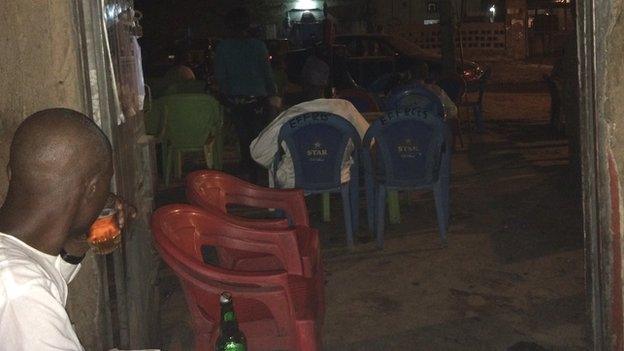
Beer is officially banned in Kano but as the sun sets in the northern Nigerian city, the outside seating at bars quickly begins to fill with drinkers, Christian and Muslims alike.
These establishments selling alcohol are along a road in the Sabon Gari suburb, an area set aside for non-Muslim residents of the bustling commercial centre.
Here Sharia does not apply, so these beer parlours, as they are called, are tolerated by the Hisbah - the city's Islamic police force.
"Business is booming," says barman Paul Bini.
"It gets very full - both men and women come and people from outside Sabon Gari."
He is referring to those from the Hausa community, the Muslims who come to Sabon Gari to secretly enjoy its nightlife.
The bars here stay open until the early hours of the morning most days of the week.
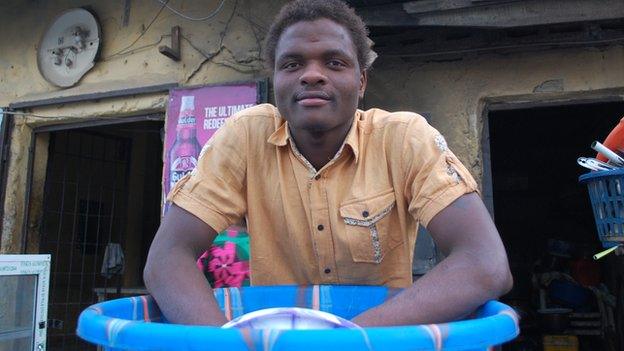
Paul Bini says he keeps the bar he runs open until 02:00 most days
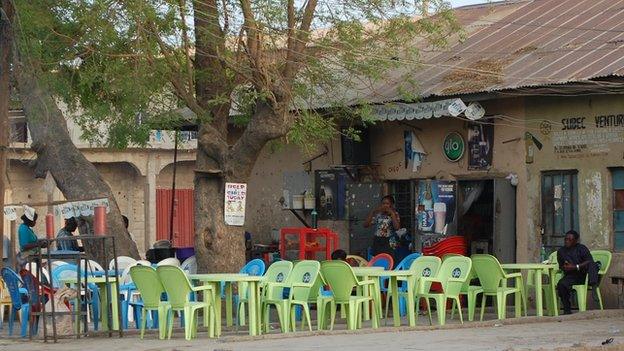
The bars open in the late afternoon - and start filling up after sunset
Loud music plays and football matches are often shown on small TV sets; and in the early evening prostitutes gather on the other side of the ditch between the beer parlours and the road.
"Without the Hausa community, the beer business in Sabon Gari would collapse," says Dr Patrick Ayelangbe, the leader of Kano's Non-Indigenes Community Leaders Association (Nicola) - representing the city's residents who originally come from other parts of Nigeria.
'Safety of darkness'
And on a visit to the bars one evening many of the drinkers are Hausa Muslims: Two men sitting at an outside table with bottles of beer agree to talk but refuse to have their photos taken - as is the case with most drinkers.
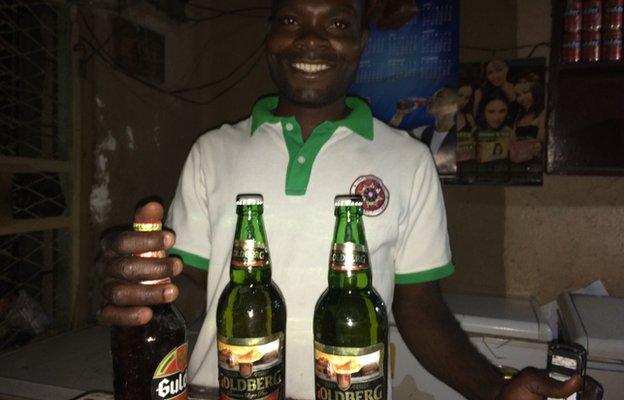
Bar manager Victor Akpan says there is never friction between drinkers
They say that they do not want to be recognised by their families - and they add that many Muslims chose to come here in the safety of darkness to drink.
"Sometimes three times in a week I come," says businessman Mohammed Abdul.
His companion Tanko Ali Aware says if a Muslim is arrested for drinking alcohol by the Sharia police in Kano, the punishment is to humiliate their family.
"When you are caught, you are shown on the TV: 'Look at this person, he's the son of this, the grandfather of this,'" he says.


Sharia was introduced in Kano in 2000
Prostitution, gambling and the consumption of alcohol were banned
Christians living in Kano are not subject to Islamic law

But the Hisbah tend not to raid the bars, so the drinkers are safe.
"I have seen the Hisbah passing by, but they never come to disturb us," says Victor Akpan, who manages what he says is Old School Bar - though some of his regular customers dispute the name - most of the ramshackle buildings only having posters from breweries as signage.
It is known for showing Chelsea matches, as Mr Akpan is a fan of the Blues.
The small beer parlour does a roaring trade, making up to 60,000 naira ($300; £200) a night - that works out at more than 200 bottles of beer.
"But we give our customers what they want, so my customer if he is a Barcelona fan - definitely I'll put Barcelona match on because I want money - that's entertainment," says Mr Akpan.
Two of his customers squeeze inside by the bar counter, where a television is showing an English Premiership match, chatting politics ahead of the elections later this month.
"We've been coming here for 10 years drinking comfortably," says Adams Mohammed, a 55-year-old technician.
He and his friend - who did not want to be identified - said that there was no tension between Kano's different communities - and their only complaint was that occasionally the beer was not cold enough.

Antonia John, beer parlour owner:

"Now only God can protect us"

The one problem the beer parlours sometimes face is getting the alcohol into Kano as trucks carrying the boxes of bottles are often stopped by the Hisbah.
"You have to pay, then they will allow you [to go] - if they don't allow, they take you to station, they seize the goods," explains Mr Bini.
When this happens it leads to a scarcity of popular beers and stouts but this generally just means higher prices - the bars of Sabon Gari never run dry, says Mr Bini.
However, confiscations, and the public destruction of the bottles, occur rarely, perhaps once a year - the last shortage he says he can remember was in November.
'People love drinking'
The beer parlours of Sabon Gari have been targeted several times in the past by the Boko Haram Islamist militants - the last attack was in May 2014 at a nearby bar.
"It affects all our business," says Antonia John, who has been running her successful bar and restaurant in Sabon Gari for 17 years - she started just before Sharia was introduced in Kano state in 2000.
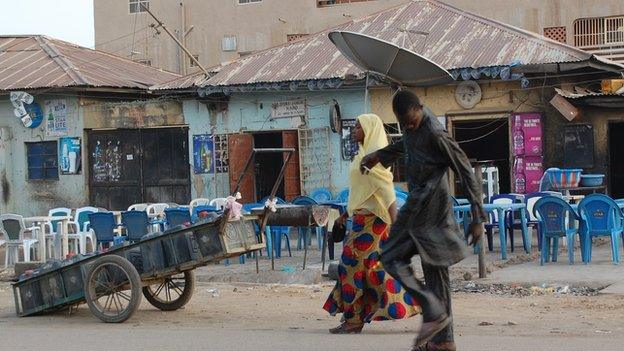
The bars have satellite dishes so that football matches can be shown
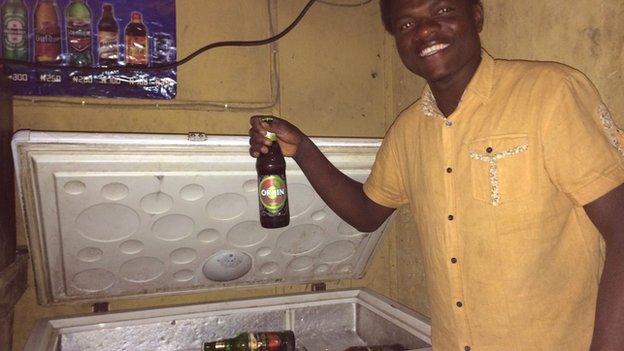
Some customers complain that the beers are not always cold enough
Drinkers tend to stay away for about a month but they crowd back, she says.
However, there are no security checks and although she recognises many of her customers, strangers do come by to drink- so it would be hard to identify a prospective attacker.
"Now only God can protect us," she says.
The regular police though do often put in an appearance, to arrest prostitutes.
"The girls run down back here [to the bars] and sit, the police won't come here, but if they catch them over there [on the road] then they will arrest them," says Mr Abdul.
But the barmen say it tends to be a money-making operation as the police usually let the women go if they are paid some money.
Femi Mohammed, a fitness instructor who has lived in Sabo Gari for seven years, says the suburb is too much of a magnet, especially for the Hausa community, for people to stay away from the bars.
"I notice people love drinking... and will drink despite the bombing."